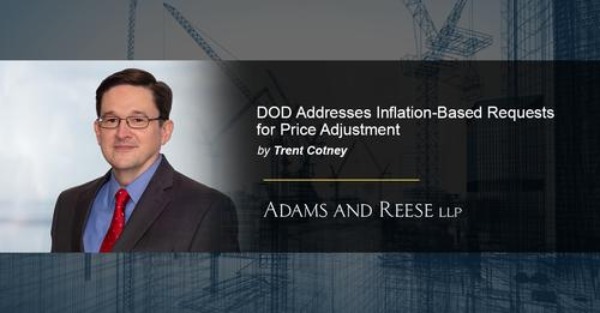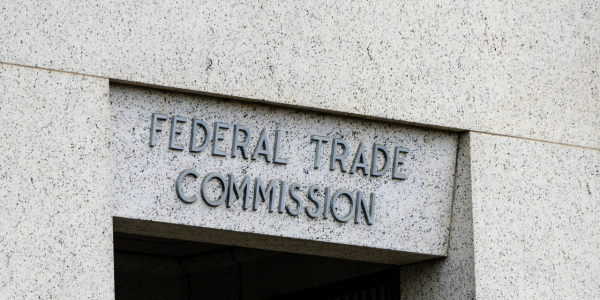UP TO THE MINUTE
DOD Addresses Inflation-based Requests for Price Adjustments

By Trent Cotney.
Learn how you can protect yourself and your business from the repercussions of inflation by adding EPAs to your next contracts.
Prices are going up everywhere — at the supermarket, at the gas station and online — with no apparent relief in sight. Construction is feeling it too with costs of materials skyrocketing. Unfortunately, based on recent guidance from the Department of Defense, federal contractors will not have much recourse.
On May 25, 2022, the DOD addressed inflation and the resulting increased contract costs that federal construction contractors are facing. Many of them had hoped to receive an equitable adjustment in their contracts, but in most cases, that does not seem likely.
What the guidance states
The DOD has recognized that “inflation is impacting several segments of our economy,” and it understands that increased costs are impacting many contractors, often destroying their profit margins. However, most contracts do not provide for adjustments.
According to the DOD guidance, contracting officers (COs) should deny requests for equitable adjustments (REAs) due to “unanticipated inflation” in the case of firm-fixed price (FFP) contracts. The DOD stated that inflation is not a change to the scope of work; instead, it is a changed economic condition. Therefore, compensation is not warranted.
However, the guidance provides an opening for claims related to inflation if the CO does make changes to the scope of the work.
Additional advice from the DOD
The only exception to granting an adjustment to an FFP contract would occur if an economic price adjustment (EPA) clause were in place. An EPA would allow a contractor to request an adjustment. However, it is rare for FFP contracts to include such a clause. And even if there is an EPA, there is likely a cap on the adjustment amount.
That limitation aside, the DOD advised that COs consider adding EPAs to future contracts. It noted that “an EPA clause may enable a contractor to accept a fixed-price contract without having to develop pricing based on worst case projections to cover the cost risk attributable to unstable market conditions because of the EPA clause’s built-in mechanism to mitigate such risk.”
What you should know about EPAs
An EPA might be a welcome addition to your next contract, but be sure you understand all that it entails:
- An EPA allows for price adjustments only when certain conditions are met, such as the costs of a specific material. As such, the clause must be written to provide clear stipulations. Any vagueness can lead to denied requests, so be sure to protest if there is any ambiguity.
- With EPA clauses, contractors must often disclose sales or financial information to the government, which will need to be verified. Therefore, you may want to object to any unreasonable disclosure requirements included in the clause.
- Keep in mind that EPAs can benefit both the contractor and the government, depending on how prices change. For example, a contractor might request an upward adjustment for increased costs, but the government can also request a downward adjustment if costs decrease.
Final advice
This recent guidance signals that the agency is not eager to provide retroactive relief for the inflationary pressure contractors are experiencing. However, this issue may change how contracts are written in the future, and you can expect to see more contracts include EPA clauses.
Contractors need to fine tune their change orders and understand the legal underpinnings for the claims they seek. For example, submitting a change order on the basis of unforeseen price increases may be supported by force majeure, commercial impracticability or arguments based on frustration of purpose of the contract. Whereas, inflation, even though it may be rampant, rarely gives rise to price relief, in and of itself. Therefore, be cautious about how you submit claims for price increases and make sure to advocate properly in all construction documents. Remember the four steps to a good change order:
- Set the stage.
- Review and cite to the contract or legal arguments to justify payment for extra work or an extension of time.
- Submit the change order pursuant to the terms in your agreement.
- Negotiate – reach out to your customer regardless of whether it is a general contractor or owner to see if you can find a middle ground resolution that both parties can understand.
About Trent Cotney
Trent Cotney is a partner and Construction Practice Group Leader at the law firm of Adams and Reese LLP and NRCA General Counsel. For more information, reach out to Trent at trent.cotney@arlaw.com.
The information contained in this article is for general educational information only. This information does not constitute legal advice, is not intended to constitute legal advice, nor should it be relied upon as legal advice for your specific factual pattern or situation.




















Comments
Leave a Reply
Have an account? Login to leave a comment!
Sign In